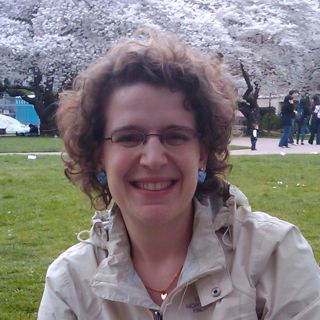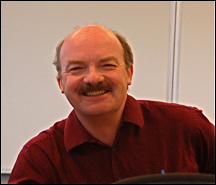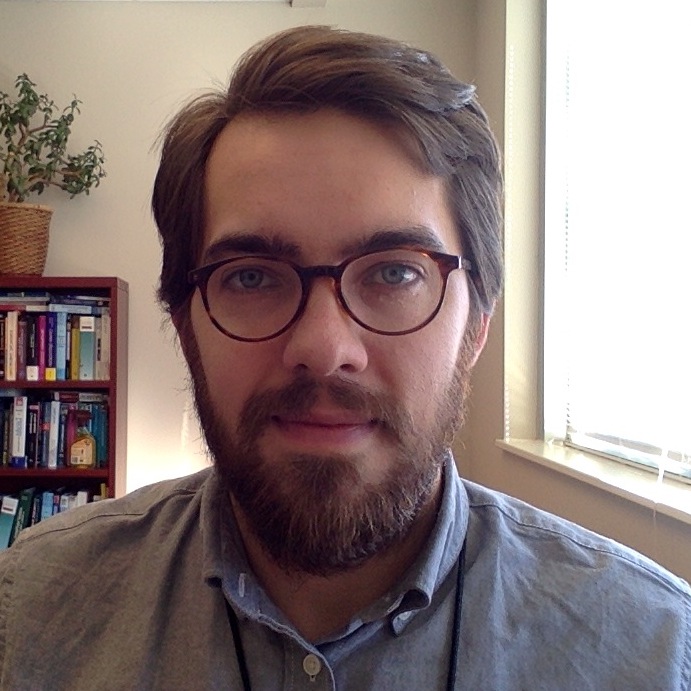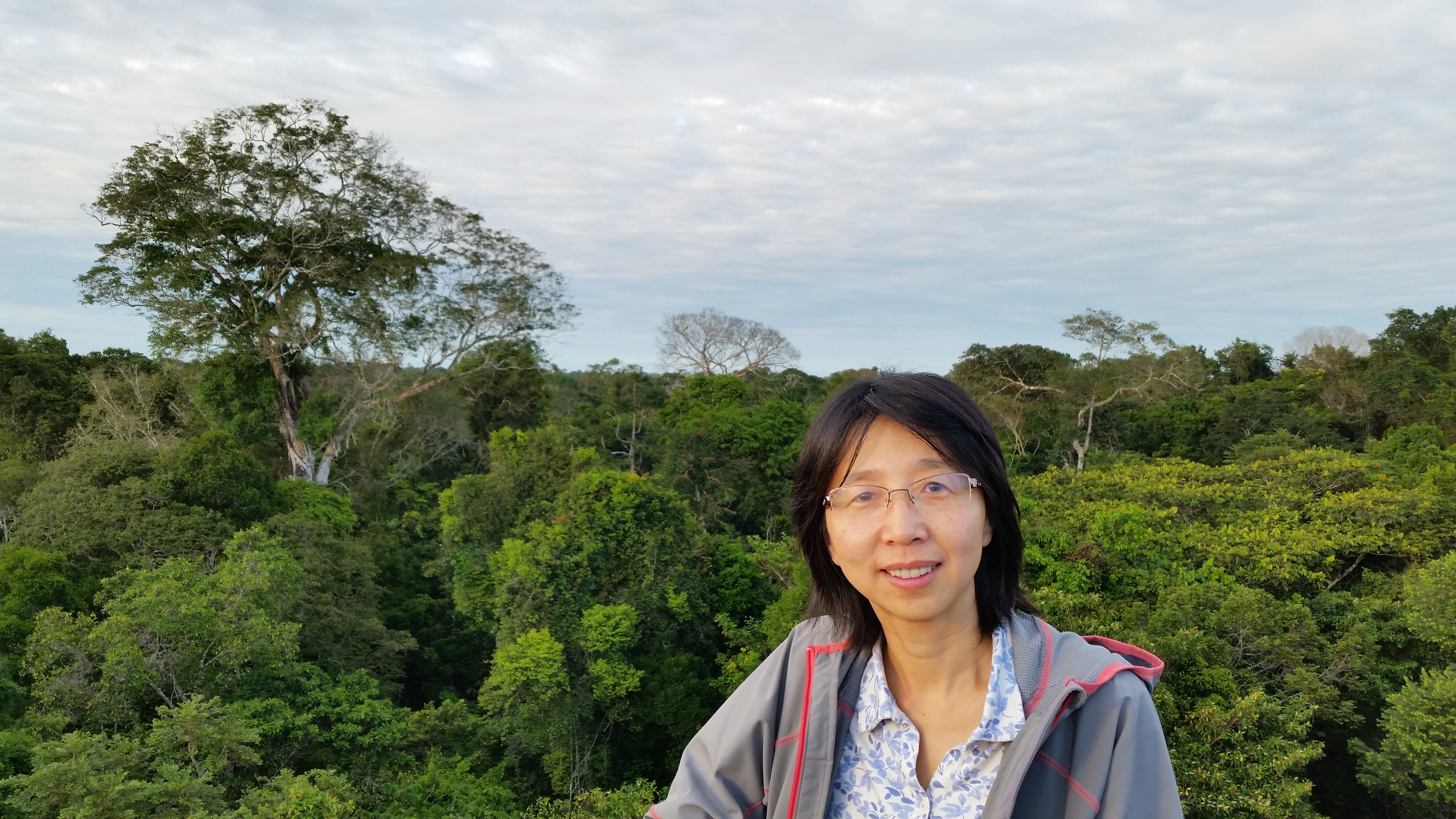NAACL Officers 2015
Officers
| Chair | Hal Daumé III | University of Maryland | 2014-2015 |
| Secretary | Michael White | The Ohio State University | 2014-2015 |
| Treasurer | Joel Tetreault | Yahoo Labs | 2015-2016 |
| Past Chair | Chris Callison-Burch | University of Pennsylvania | 2012-2013 |
Executive Board
| Board Member | Emily M. Bender | University of Washington | 2014-2015 |
| Board Member | Eduard Hovy | Carnegie Mellon University | 2014-2015 |
| Board Member | Matt Post | Johns Hopkins University | 2015-2016 |
| Board Member | Fei Xia | University of Washington | 2015-2016 |
Ex-Officio Board Members
| Graeme Hirst | University of Toronto | ACL Treasurer |
Nominating Committee
- Kristina Toutanova (chair)
- David Chiang
- Mona Diab
- Rebecca Hwa
- Anoop Sarkar
Chair (2014-2015) | Hal Daumé III | University of Maryland

Bio
Hal Daumé III is or was: an Associate Professor at UMD in CS and Linguistics; program co-chair of NAACL 2013; NAACL exec member; ed board member for CL, JAIR and MLJ; author of the NLPers blog; assistant professor at U of Utah; grad student at ISI; intern at Microsoft; sponsorship chair for NAACL; sponsorship and pubs chair for ICML; publicity chair for ACL and ICML; avid workshop organizer and tutorial giver; amazed you read this far; former co-director of the UMD CLIP lab.
Candidacy Statement
NAACL as a conference is great, and we can improve: reviewing, physical and virtual socialization, and memory of the past. NAACL as an organization is also fantastic, and we can take an active leadership role in promoting NLP/CL as a field within the Americas.
Secretary (2014-2015) | Michael White | The Ohio State University

Bio
Michael White is an Associate Professor in the Department of Linguistics at The Ohio State University. Since obtaining his Ph.D. in Computer and Information Science from the University of Pennsylvania, he has worked for many years in the fields of natural language generation and dialogue systems, first at CoGenTex, Inc., then across the pond at the University of Edinburgh, and most recently at Ohio State. He has served as local sponsorship chair for ACL 2008 and publications co-chair for ACL 2012; served on the SIGGEN board and Computational Linguistics editorial board; co-organized an NSF workshop on shared tasks in NLG, the INLG 2008 conference, and the first surface realization shared task challenge; and helped lead OSU to become one of the top NACLO hosts in terms of participation.
Candidacy Statement
One of the main duties of the NAACL secretary is to maintain NAACL’s web presence. The last time NAACL elected a new secretary, the candidate stated that he intended to update the naacl.org website not only to look better, but also to be more functional. With Anoop Sarkar having largely accomplished this mission, I thought it might be safe to run for secretary on the platform of simply trying not to make a hash of his good work, and perhaps even trying to further his goal of archiving useful information about the NAACL conferences, such as videos of tutorials. However, I am told that the secretary is also likely be the point person on any new social media outreach NAACL might undertake. As such, I thought I should also promise to work with the NAACL board to develop and implement policies for any proposed increase in the use of social media, with the goal of raising NAACL’s visibility while avoiding embarrassing gaffes. For example, social media might be used to highlight mentions of computational linguistics in the popular press. Finally, as a board member, I would be particularly keen to support outreach efforts for students, including continued support for the NACLO competition, as well as efforts to encourage interchanges and collaborations with linguists and cognitive scientists.
Treasurer (2015-2016) | Joel Tetreault | Yahoo Labs

Bio
Joel Tetreault is a Senior Research Scientist at Yahoo Labs in NYC. Previously he was Senior Principal Manager at Nuance Communications and Senior Managing Research Scientist at Educational Testing Service. His research interests include discourse processing, grammatical error detection, automated essay scoring, and dialogue systems. He received his PhD at the University of Rochester and was a postdoctoral researcher at the University of Pittsburgh before joining ETS. He is the current NAACL Treasurer, served as Area Chair for NAACL 2010, Session Chairs for NAACL/ACL 2010-2013, Exhibits Chair for NAACL 2012, co-organizes the Building Educational Applications workshop since 2008, and maintains the primary conference calendar for our community (since 2004).
Candidacy Statement
The NAACL Treasurer monitors and reports on the finances of the organization, provides feedback to the NAACL board on which practices have been successful and how best to use our budget for the future. Over the last two years as NAACL Treasurer, my primary focus was to rebuild our bank account. A healthy bank account is important for two reasons. First, it allows us to fund important computational linguistics activities such as North American Computational Linguistics Olympiad (NACLO) and NLP conferences in emerging regions such as Central and South America. Activities such as these are likely to have a long-term effect on the growth of our field. Second, it allows us to better absorb any potential losses from a future NAACL conference. I worked with the rest of the NAACL board, Priscilla Rasmussen, and the previous treasurer, Chris Manning, to implement a sound strategy to rebuild our bank account. While our state of affairs has improved, there is still much work still to be done. If elected, I want to 1) continue with a conservative plan for our spending, 2) be aggressive and creative about seeking sponsorship and 3) minimize the risk of a conference operating at a loss.
Past Chair (2012-2013) | Chris-Callison Burch | Johns Hopkins University

Bio
Chris Callison-Burch is an Associate Research Professor at the Center for Language and Speech Processing (CLSP) at Johns Hopkins University. He received his PhD from the University of Edinburgh’s School of Informatics in 2008 and his bachelors from Stanford University’s Symbolic Systems Program in 2000. His research focuses on statistical machine translation, crowdsourcing, and broad coverage semantics via paraphrasing. He has contributed to the research community by releasing open source software like Moses and Joshua, and by organizing the shared tasks for the annual Workshop on Statistical Machine Translation (WMT). He is on the editorial board of Computational Linguistics, and he is doing pretty well on the ACL Anthology Network leaderboard.
Candidacy Statement
The past two years as a NAACL executive board member has given me an excellent understanding of how the organization works, and what its role is beyond maintaining a high-caliber scientific conference. If I am elected chair, I will continue past initiatives like funding the NAACL summer school at Johns Hopkins University and doing active outreach to South America. I will also put forward my own agenda. I will improve reviewing by liaising with the Softconf developers to create single logins for every reviewer, and to specially treat resubmissions of rejected papers by giving current reviewers access to the previous set of reviews and to author responses. As a result of my experience digitizing videos for the past decade of the CLSP seminar series, I would like to begin an initiative to create a NAACL video archive that records the talks given at our conferences. I will give NAACL’s support for the new journal initiative. Finally, I will work to ensure that our conferences continue to be a success. (I am taking my campaign to the tweets! You can follow my outlandish campaign promises on Twitter @ccb).
Board Member (2014-2015) | Emily M. Bender | University of Washington

Bio
Emily M. Bender is an Associate Professor of Linguistics and an Adjunct Associate Professor of Computer Science and Engineering at the University of Washington, where she has been a member of the faculty since 2003. Her primary research interests are in multilingual grammar engineering and deep linguistic processing. She is the Linguistic Society of America’s delegate to the ACL and the faculty director of UW’s professional MS in Computational Linguistics. In 2009 she co-organized a panel session on computational methods in support of linguistic analysis at LSA and an NSF-sponsored workshop on Cyberinfrastructure for Linguistics.
Candidacy Statement
If elected to the NAACL board, I will focus my efforts on the three Rs: Reproducibility, Reviewing, and Reinvigorating interdisciplinarity in our field.
Reproducibility is the hallmark of scientific work. The recent move to allow publication of data and code in ACL-published proceedings is an enormous step towards reproducibility. NAACL-HLT should absolutely participate in this trend. However, there is still work to be done to make sure that the published resources are in fact useful in advancing the state of the art. For example, CC BY-NC-SA 3.0 is not the right license for every NAACL-HLT author. Furthermore, we have not yet worked out how to efficiently and effectively review these materials.
Reviewing is central to the quality of conferences and publications. The reputation of the NAACL-HLT conference elicits considerable effort on the part of reviewers, yet there is still room to improve the way that that effort is focused. A system of incentives to encourage reviewing that is fair, rigorous, and constructive could include feedback to reviewers by area chairs, co-reviewers and even authors as well as recognition for outstanding reviewing.
Reinvigorating interdisciplinarity: Solving big problems in human language technology requires both sophisticated algorithms and understanding of the domain of application of those algorithms. Yet, the integration of linguistic knowledge in our field falls short of this ideal. I will work towards bringing relevant Linguistics to NAACL in the form of tutorials, building connections to NASSLLI, and other means of making Linguistics accessible to HLT researchers.
Board Member (2014-2015) | Eduard Hovy | Carnegie Mellon University

Bio
Eduard Hovy recently joined the Language Technologies Institute at CMU, after heading the Natural Language Group at USC/ISI for many years. He has performed research in topics like coreference, summarization, text mining, information extraction, QA, machine translation evaluation, and language generation. He served as the President of ACL in 2001.
Candidacy Statement
I have two goals. First, NAACL is ten years old this year. It has developed rather differently than was originally intended, and does not fulfill its potential as a bridge between other more-mature areas of language technology (including IR and Speech Recognition). It was suggested that I (as one of the establishers of the society) may help in exploring a wider role for the NAACL and the conference. Second, as described in www.force11.org, the potential of new forms of publication (pdf+code+corpus, interrelated with other publications, with tools to analyze and process them in interesting ways) is a vision that can deeply change all of scholarly publication, in sciences and humanities alike. Our community is the one to make [much of] this possible. I would like to make this happen.
Board Member (2015-2016) | Matt Post | Johns Hopkins University

Bio
Matt Post is a Senior Research Scientist at the Human Language Technology Center of Excellence (HLTCOE) at Johns Hopkins University, where he works on machine translation. His research interests include machine translation, language modeling, and grammaticality, with syntactic approaches to these tasks serving as a common underlying theme. He received his Ph.D. from the University of Rochester. He has co-organized the Workshop on Statistical Machine Translation for the past three years, and is serving as the NAACL 2013 & 2015 publications co-chair.
Candidacy Statement
My main interest as a member of the NAACL executive committee is to direct some attention to (1) increasing community efforts towards reproducibility of research and (2) improving the conference management process.
Reproducibility is the cornerstone of good science, and yet it receives far less attention than primary research contributions. This imbalance has contributed to very low reproducibility rates reported across scientific fields, and undermines scientific pursuits in a number of ways. Computer scientists are well positioned to make reproducibility easy, but doing so still requires extra work on the part of both the reproducer and the reproduce, which is often unrewarded. While our community has an established habit of sharing code and data, these efforts fall far short of what they should be. As part of keeping our house in order, NAACL should find ways to reward efforts in the area of reproducibility.
A point of distinction for our research community is the extensive body of code used to produce our annual proceedings and conference manuals. This has been built up over the years and yields useful, high-quality proceedings. While improvements are made each year to this codebase and the conference management system that surrounds it (including the recent unified login system for reviewers), there remains a lot of relearning, trial-and-error, redundant effort, and subsequent frustration on the part of each year’s conference organizers, reviewers, and submitters. Softconf has been very helpful in this process so far, but there is much more that could be done were someone to give it some time, money, and attention.
Board Member (2015-2016) | Fei Xia | University of Washington

Bio
Fei Xia is an Associate Professor at the Linguistics Department at the University of Washington (UW) and an adjunct faculty at the Department of Biomedical Informatics and Medical Education at the UW Medical School. She received her PhD from the University of Pennsylvania in 2001. After graduation, she worked at the IBM T. J. Watson Research Center before joining UW in 2005. Fei co-chaired one conference and eight workshops, and was on the organizing committees of five other NLP conferences. She is also an editorial board member of several journals (e.g., CL, LRE and TALIP) and an officer of two ACL Special Interest Groups (SIGANN and SIGHAN). Her current research focuses on treebank development, bio-NLP, and creating resources and NLP systems for resource-poor languages.
Candidacy Statement
One issue that requires more discussion and clarification is about the service region of NAACL. According to the current NAACL Constitution, NAACL will serve “all members of the Association who reside in North America. In addition, until regional chapters are created for the Association members in the adjacent regions of Central America and South America, the Chapter will serve them as well.” As far as I know, there have never been any major ACL conferences held in Latin America, so it is unlikely that region chapters of ACL would be created for that region in the near future. Given this, I feel that it is important to clarify whether NAACL intends to serve that region for a long term. If the answer is affirmative, it might be good to change the acronym “NAACL” (as suggested by David Chiang last year) to indicate that the organization is not only for North America; the NAACL constitution has to be revised accordingly as well. In addition, as a first step to promote NLP research in that region, we should seriously consider holding an NAACL conference or sponsoring a regional conference in Latin America in the near future.
Another area that I feel passionate about is to promote more collaboration between NLP researchers and linguists. In the past two decades, with the advancement of machine learning methods and the availability of data resources such as treebanks and parallel corpora, data-driven approaches to NLP have made significant progress. The success of such data-driven approaches has cast doubt on the relevance of linguistics to NLP. Conversely, NLP techniques are rarely used to help linguistics studies. I believe that there is much room to expand the involvement of linguistics in NLP, and likewise, NLP in linguistics, and that the cross-pollination of ideas between the disciplines can greatly benefit both fields. Lori Levin, William Lewis, and I organized the ACL 2010 workshop NLP and Linguistics: Finding the Common Ground. The workshop was sponsored by NSF and drew wide attendance from both NLP and linguistics fields. I hope that NAACL will support effort in this area.
Besides general linguistics, there are many other disciplines that would benefit from NLP, such as sociolinguistics, psycholinguistics, social sciences, bioinformatics, and even business schools. For instance, recently there have many studies on using NLP techniques to analyze political blogs, hospital notes, or business reports. There are many ways that NAACL can promote interdisciplinary studies; for instance, we can add a new research area on interdisciplinary studies for NAACL paper submission; we can also work with funding agencies and industry to seek their support in funding such research.